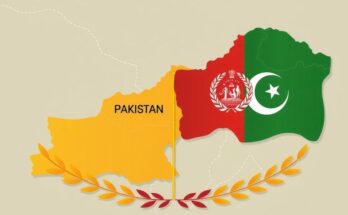Bahia Blanca, Argentina, was devastated by a storm that brought an entire year’s worth of rain in hours, resulting in 13 deaths and hundreds displaced. Environmental officials point to climate change as a significant factor. Emergency funds have been authorized for recovery efforts, while rescue operations are underway for those affected by flooding.
Bahia Blanca, a port city in Argentina, recently experienced a catastrophic storm that unleashed an entire year’s worth of rainfall in just a few hours, leading to the tragic deaths of 13 individuals and displacing numerous residents. Following the storm on Friday, two young girls aged one and four remain missing, reportedly swept away by floodwaters. The city’s infrastructure has suffered severe damage, and areas have become submerged, prompting National Security Minister Patricia Bullrich to declare the city as “destroyed.”
The rainfall, measured at nearly 400 millimetres (approximately 15.7 inches) within eight hours, was described as “unprecedented” by provincial security minister Javier Alonso. As a result, many fatalities occurred on flooded roads, where victims were presumably trapped in vehicles as waters surged. The city, located 600 kilometres southwest of Buenos Aires, faces a potential rise in its death toll according to local officials.
Tempers escalated during the government’s visit to the disaster-stricken neighborhood, as residents expressed frustration that officials did not arrive sooner. A video circulated on social media depicted citizens urging Minister Bullrich to enter the floodwaters, illustrating the heightened emotions among the affected populace. Environmental official Andrea Dufourg characterized the storm as a significant indicator of climate change, emphasizing the necessity for enhanced preparedness and educational initiatives regarding extreme weather events.
The evacuation efforts included relocating patients from Jose Penna Hospital, where healthcare workers were filmed rescuing infants amidst rising floodwater. While the hospital suffered substantial water damage, healthcare professionals expressed gratitude that no lives were lost in their community. Reports also indicated instances of looting in flooded shops, underscoring the turmoil facing local businesses.
The government has allocated emergency reconstruction funds amounting to 10 billion pesos (approximately $9.2 million), while power outages affected much of the coastal region. Bahia Blanca has a history of weather-related calamities, including a deadly storm in December 2023 that also resulted in 13 fatalities. Although the storm did impact Buenos Aires, it did not lead to significant destruction in the capital.
In summary, the storm in Bahia Blanca has inflicted widespread devastation, resulting in 13 fatalities, numerous displacements, and considerable infrastructure damage. This incident highlights the urgent need for preparation and responses to severe weather events exacerbated by climate change. As recovery efforts commence, the community continues to face challenges in restoring normalcy.
The storm in Bahia Blanca serves as a grave reminder of the increasing frequency and severity of climate-related disasters. With 13 confirmed deaths and hundreds displaced, the event underscores the importance of urban preparedness and effective disaster management strategies. As reconstruction efforts begin, the community must address the underlying challenges posed by extreme weather, emphasizing proactive measures to mitigate future impacts.
Original Source: www.firstpost.com




